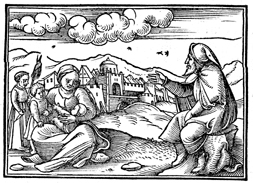Hosea: Upon Every Cornfloor
HOSEA: Upon Every Cornfloor
"I found Israel," says the Hebrew God Yahweh in the book of Hosea, "like grapes in the wilderness" (9:10). But like an unfaithful wife, Israel--whom the prophet Hosea also refers to as Ephraim (a preeminent Israelite tribe) and Samaria (Israel's capital city)--turns to idolatry, "playing the harlot" (4:15), her "lovers" being Baal and the other Canaanite gods (2:13). In their adultery, says Hosea of the Israelites, they are like "an oven heated by the baker," an oven flaming in the morning while the drunken baker sleeps (7:4-6).
As if to symbolize his people's apostasy, Yahweh commands Hosea to "Go, take unto thee a wife of whoredoms and children of whoredoms, for the land hath committed great whoredom, departing from the Lord" (1:2). Hosea accordingly marries Gomer, a whore who bears three children--Jezreel ("God sows"), Loruhamah ("Not pitied"), and Loammi ("Not my people")--who are apparently not Hosea's (1:3-9; 2:4).
Not surprisingly Gomer leaves Hosea, after which Yahweh tells the prophet, "Go yet, love a woman beloved of her friend, yet an adulteress" (3:1). This is generally thought to be Gomer again, though it may be a second woman. In any case Hosea's love for the woman despite her adultery reflects Yahweh's love for and redemption of the chastised children of Israel (2:16-20; 3:5; 5:15-6:3; 14:4-7).
Hosea dutifully buys the woman (we are not told from whom) for fifteen pieces of silver and several bushels of barley. "Thou shalt abide for me many days," Hosea tells her, "thou shalt not play the harlot, and thou shalt not be for another man" (3:1-3). But the habitually unfaithful Israel, who loves "a reward upon every cornfloor" (9:1), seems unable to abide for long. Hosea thus calls upon Yahweh to make Ephraim miscarrying and milkless (9:14), and prophesies the slaughter of children and pregnant women in Samaria (13:16). Not even the kingdom of Judah to the south will escape divine punishment: "I will pour out my wrath upon (the princes of Judah) like water" (5:10; see also 12:2).
The book of Hosea ends with hopeful words of Israel's restoration. But Hosea's imagery of violence toward women (not to mention toward children)--imagery that is continued by other prophets is no less troubling to feminist commentators. "Let her therefore put away her whoredoms . . . and her adulteries from between her breasts," says Yahweh, lest "I strip her naked" and (comparing her to parched land) "slay her with thirst" (2:2-3). "And I will not have mercy on her children," he goes on, "for they be the children of whoredoms" (2:4). "(I will uncover) her lewdness in the sight of her lovers, and none," says Yahweh, "shall deliver her out of mine hand" (2:10).



0 Comments:
Post a Comment
<< Home